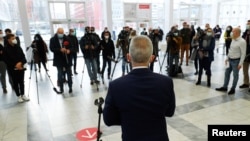The COVID-19 pandemic has had a large effect on worldwide media.
There is some increased censorship and harassment of reporters in several countries. But there is also a growing belief in the importance of truthful reporting, media experts say.
In early December, the World Press Freedom Conference met online to discuss problems facing reporters. It said some small news organizations were forced out of business and reporters in some countries have faced threats.
But the group said the main problem for the news industry was an “avalanche” of disinformation.
“Now more than ever we need news we can trust,” said Jesper Højberg. He is executive director of the Denmark-based nonprofit International Media Support (IMS). He spoke in a video to the members. He also said that the need for truthful information has shown the public the “importance of critical, reliable information.”
Some emergency measures taken because of the spread of COVID-19 have been used to restrict the media this year. The group IMS assists media in countries affected by conflict or insecurity. It contacted its partners to get an understanding of what is happening to press freedom in their countries.
“We've been very conscious of the importance of fully understanding how COVID-19 has affected…the reality of our partners,” Højberg told VOA.
The IMS findings showed both good and bad effects on the media, including an increase in readers and listeners.
Hojberg said his organization has seen officials “blocking webpages that are trying to provide a different information reality.”
But the IMS also saw a slow, but steady increase of trust in media and civil society as citizens looked for information they were unable to get from government officials.
Media survival
The media has experienced job losses and closures during the pandemic. Support for the media industry is part of a separate project by UNESCO and World Association of News Publishers.
Those organizations said in a joint statement that the “decimation” of solid, truthful reporting in many areas of the world is “a growing threat.”
Guy Berger is director of freedom of expression and media development at UNESCO. He told VOA the project is a way to help local media during the digital age, but also to assist with the COVID-19 pandemic’s effect on local economies.
The project covers many different news providers, including broadcast, community radio and news websites. The aim is to mainly deal with countries in Africa, Latin America and Asia, Berger said.
“We will be looking at the markets, audiences, regulations, as well as the business and journalistic practices of individual media,” Berger said. He added that they plan to have the research completed by the first half of 2021.
The research will lead to policy recommendations to help develop a strong and independent media environment, Berger explained.
UNESCO will also partner with a working group under the Forum on Information & Democracy. Several other organizations were working on the same issue so it made sense to cooperate, Berger said.
“The two groups will inform each other about their work, as well as other stakeholders in the media development community. UNESCO will be an observer at the working group,” he added.
The pandemic has revealed the importance of ensuring that local media survives.
“I think some of the media that we work with also have gained a completely new sense of purpose,” said Højberg, of the IMS, adding that having independent media during such a crisis is “extremely important.”
I’m Susan Shand.
Voice of America’s Aneeta Mathur-Ashton reported this story. Susan Shand adapted it for Learning English. Mario Ritter, Jr. was the editor.
____________________________________________________________
Words In This Story
censorship – n. a system of removing from books, movies, letter and other media unapproved material
harassment – n. repeatedly bothering or causing problems for someone
avalanche – n. a sudden amount of something; a large amount of snow or ice
reliable – adj. able to be trusted or believed in
decimation – n. to damage or destroy a large number of things or a large part of something
journalism – n. the job of collecting, writing and editing new stories for newspapers, magazines, television and radio
stakeholder – n. a person or business that has invested money in something, such as a company





